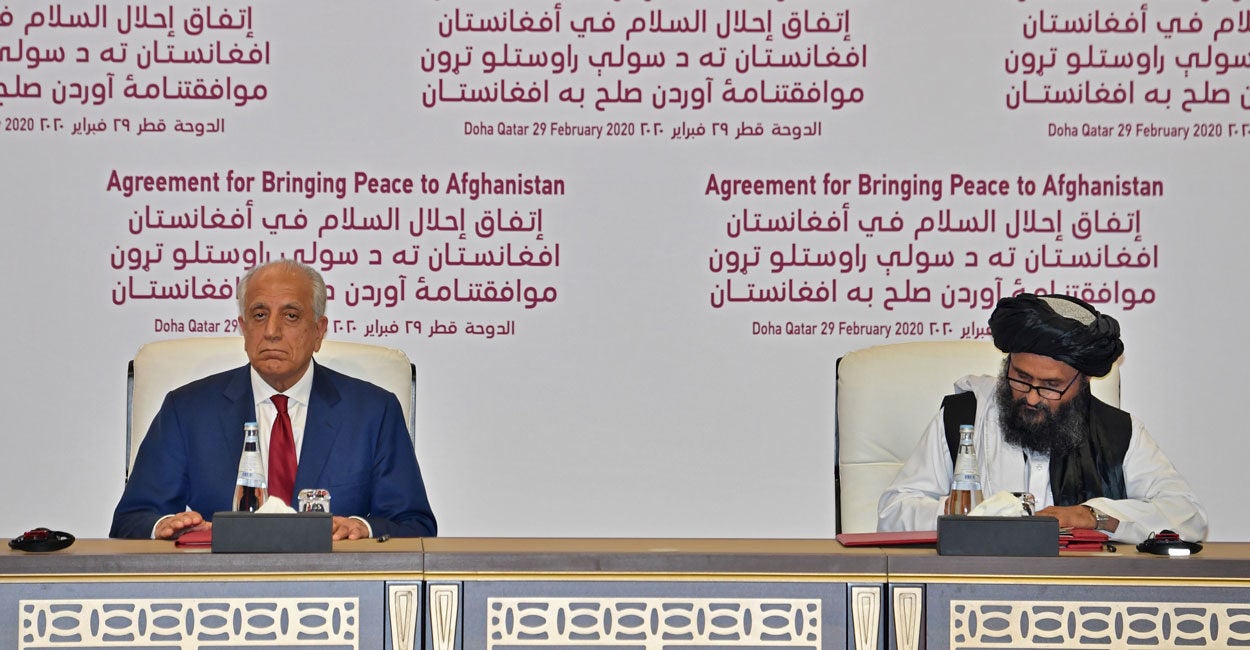A U.S. special envoy and a senior Taliban representative signed an agreement Saturday in Doha, Qatar, that aims to be the first step to bring peace to Afghanistan and allow U.S. troops to come home.In the seven days leading up to the signing ceremony, violence by all sides in Afghanistan had dropped. While there were some attacks, the overall trajectory and levels of violence were reduced drastically. After concluding that the reduction in violence was satisfactory, President Donald Trump gave the green light for Secretary of State Mike Pompeo to accept the deal, which comes more than 18 years after the U.S. invaded Afghanistan following the terrorist attacks of Sept. 11, 2001.
Pompeo was present in Doha as U.S. special envoy Zalmay Khalilzad and Taliban co-founder and chief negotiator Abdul Ghani Baradar signed the agreement that resulted from more than a year of on-and-off formal talks. Among those also present were the foreign ministers of Turkey and Pakistan.
This is a first step in what will be a long, drawn-out process. The Afghan people want peace, having known some form of war since 1979. The Taliban knows it cannot win on the battlefield. The U.S. wants to remain safe from international terrorism. The comprehensive agreement between the U.S. and the Taliban is built on three main points:
First, the Taliban agreed that it will not allow al-Qaeda or any other transnational terrorist group to use Afghan soil. To this end, the Taliban agreed to guarantees and enforcement mechanisms to make sure this remains the case. Trust but verify.
Second, the United States and its allies agreed to a timeline to withdraw all forces from Afghanistan. Within 135 days, U.S. forces will drop to 8,600—roughly the number of troops in Afghanistan when Trump entered office. About 13,000 U.S. troops are there now. International forces will reduce their troop presence proportionately. Then, if the U.S. assesses that the Taliban is living up to its end of the bargain, the remaining U.S. and international forces will withdraw nine and a half months later.
Third, and most importantly, talks within Afghanistan between the government and the Taliban will take place March 10. This is the most crucial stage in the peace process. It does not matter what the U.S. agrees to with the Taliban; what matters most is what the Afghan government agrees to with the Taliban.
Many questions remain unanswered. And healthy skepticism is only natural under circumstances like this. But ultimately it is for all Afghans—those who support the government in Kabul and those who identify as Taliban—to settle their differences. The Afghan government has been fighting a Taliban-led insurgency. History shows that most insurgencies are successfully brought to an end through a political settlement. After all, the most basic goal of any counterinsurgency campaign is to allow those who have political grievances the ability to express these grievances through a political process rather than through violence. This is the goal of the intra-Afghan talks. You no more can kill your way out of an insurgency than you can drink yourself out of alcoholism.
Can we trust the Taliban? This remains to be seen. One thing is for certain: The Afghan people have to trust the Taliban. It is the final deal between these two groups that will determine if this process is a success. Since 2001, more than 2,400 Americans have died in Afghanistan and more than 20,500 have been wounded.
The United States needs to make crystal clear that if the Taliban backtracks on any part of the agreement, there will be consequences.
Ihe U.S. also needs to make clear to the Taliban, and to the international community, that the legitimate government of Afghanistan is an important partner for the U.S. and that we won’t abandon them.
Many ups and downs will follow in the next few months. Progress will not be made quickly, at times it will look like the talks will break down, and it is possible that the negotiations will get nowhere. But for the Afghan people who have suffered more than 40 years of war, this peace plan is a realistic, responsible, and reasonable approach.
As a young Winston Churchill said in 1897, when he was fighting as a British army officer on what is the modern-day Afghan-Pakistan border: "There are no general actions on a great scale, no brilliant successes, no important surrenders, no chance for a coup de theatre. It is just a rough, hard job, which must be carried through. The war is one of small incidents. The victory must be looked for in the results."
Some things never change. What was true in 1897 is as true in 2020. It won’t be pretty and there will be setbacks—as Churchill reminds us: “It is a rough, hard job.” As long as America and its allies remain safe, and as long as the Afghan people are at peace, this process is well worth a shot.
[italics and colored emphasis mine]
Luke Coffey oversees research on nations stretching from South America to the Middle East as director of the Allison Center for Foreign Policy Studies at The Heritage Foundation. Read his research.
the disorder of the world. - Karl Barth








No comments:
Post a Comment